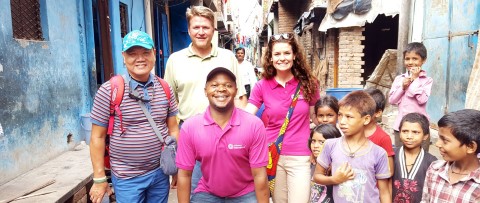- Thought Leadership


Kristen Mallory
Senior Technical Officer – Health Systems and Innovation
Before joining CI in 2015, Kristen lived in Ecuador for several years, volunteering with the Peace Corps. Before that, she spent three years in Honduras, working with a nonprofit addressing HIV/AIDS-related issues.
When historically underrepresented youth become leaders of change advocating for access to health services, we have a fighting chance of “building a fairer and healthier world.”
The theme of fairness in global health and health systems for this year’s World Health Day (April 7) is particularly relevant in these challenging times. The pandemic reminded us of the importance of health and health systems and shed a light on the gaps and weaknesses within these systems. While the pandemic affected every one of us in some way, the crisis further exacerbated inequities, and the most vulnerable have paid the greatest price.
At Children International, a humanitarian organization that works to end poverty, we deeply believe that health is a human right. Everyone, everywhere should have access to essential health services, especially children. One way our organization helps strengthen local health systems in the 10 countries where we work is by engaging youth to address the inequities that prohibit them from realizing their full rights to health and well-being.
Social accountability, or society’s role in improving government accountability, is a method of engagement thought to be essential in achieving the United Nations’ Sustainable Development Goal 3: Ensure healthy lives and well-being. Children International also sees social accountability as a powerful tool to equip youth, a group often times overlooked, as advocates for their own rights to the health services they need.
During a recent panel discussion at CORE group’s global health conference, I had the opportunity to represent Children International to highlight the nexus between health systems and youth development through social accountability. The message from Children International was this: Youth have a key role to play in health systems improvements, especially in regard to services for their demographic. Emanuel, a stellar CI sponsored youth from the Dominican Republic, joined me on the panel and had this to say:

In Guatemala, Kristen shows a mother and child how a new malnutrition indicator works.

As the world works to rebuild broken health systems, more voices and ideas should be invited to the table. I propose that we amplify the voices of youth and others who have been historically underrepresented and suffered poor health outcomes. I am hopeful that Children International’s approach to strengthening systems by engaging communities and youth will begin to address the power dynamics and systems that have prohibited rights to health and well-being. Building a fairer and healthier world will require innovation, more diverse voices and radical collaboration! Children International is committed to fully supporting communities for the healthiest possible outcomes for children, youth and their families.

One of Kristen's favorite things about her work is helping colleagues and youth discover their potential - and seeing them become agents of change.

On a trip to Guatemala, Kristen (in the red shirt) and colleagues take a break from training to capture the comradery they developed.
Comments
You must be logged in to comment. If you have an account, click here to log in.